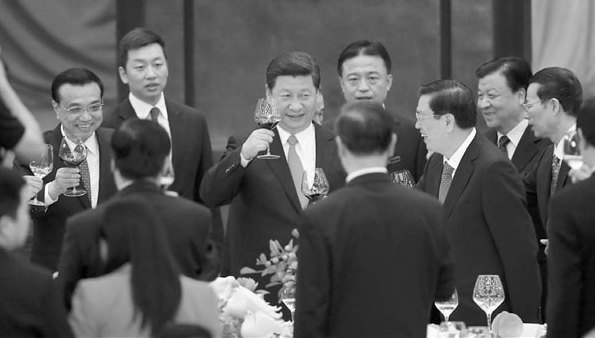High reform hopes before plenum
Updated: 2013-10-28 07:03
By Louis Kuijs and Xiaocun Tiffany Qiu (China Daily)
|
||||||||
All eyes are starting to shift to the Third Plenary Session of the Communist Party of China's Central Committee. Rather than concrete measures, the Plenum is expected to announce objectives and directions to rebalance growth toward domestic demand, consumption and services, and upgrade the industrial structure. Ever since Chinese President Xi Jinping and Premier Li Keqiang took over the CPC leadership in November last year there has been keen interest in the direction they give to the reforms.
In line with tradition, the new leadership has in the last 12 months or so been taking stock of the country's key challenges and the need and room for reform. The new leadership's statement of principles and directions of economic policy and reforms are meant to be approved by the Party plenum in November.

President Xi Jinping (center) and Premier Li Keqiang (left), along with other State leaders, propose a toast at a reception on Monday to mark the 64th anniversary of the founding of the People's Republic of China, which falls on Oct 1. Xu Jingxing / China Daily
Expectations are high for the new leadership's reform plans for several reasons. For one, many people have been wishing for reforms in various fields. In the economic and financial realm, they look forward to market-oriented reforms.
Li has already advocated economic reform principles such as changing the pattern of growth, raising domestic demand, improving the quality of urbanization and, as announced recently, changing the role of the government in the economy.
Another factor raising expectations among some is the idea that the reforms to rebalance the pattern of growth are urgently needed because without them China will soon hit a wall, and that the government knows this and is acting accordingly. We (at the Royal Bank of Scotland) do not see it like that. We think that China's economy is sufficiently robust that not tackling some of the more difficult problems will not derail growth any time soon. Yet if needed, but difficult, reforms are not pushed through, China's overall reform process could become skewed. For instance, if China maintains decent progress with necessary, easy "welfare state" types of reforms and yet cannot make progress on the difficult but essential growth and productivity enhancing rebalancing reforms, it could end up with a rebalanced but slower growing economy.
Also, if the reforms to adjust the economic structure and the domestic financial system cannot be implemented and the government presses ahead with capital account opening, the risks of financial instability would rise, as would misallocation of capital.

 Serena completes dominant season with triumph
Serena completes dominant season with triumph
 Nuclear submarine fleet comes of age
Nuclear submarine fleet comes of age
 5 pharmacies begin to sell baby formula
5 pharmacies begin to sell baby formula Mother and four children stabbed to death in New York
Mother and four children stabbed to death in New York
 China Fashion Week S/S 2014: day 2
China Fashion Week S/S 2014: day 2
 Demonstrators protest against govt surveillance in US
Demonstrators protest against govt surveillance in US
 Where art thou, my love?
Where art thou, my love?
 Li Na reaches WTA Championships final
Li Na reaches WTA Championships final
Most Viewed
Editor's Picks

|

|

|

|

|

|
Today's Top News
High speed versus history
Southern states gear up for symposium
Film finds a hip-hop-tai chi connection
Jewelry exhibit dazzles Southern California
Obama aware of spying on Merkel: German paper
Five stabbed to death in NYC
Forum urges stable China-Japan ties
NSA spying hurts US diplomacy
US Weekly

|

|






